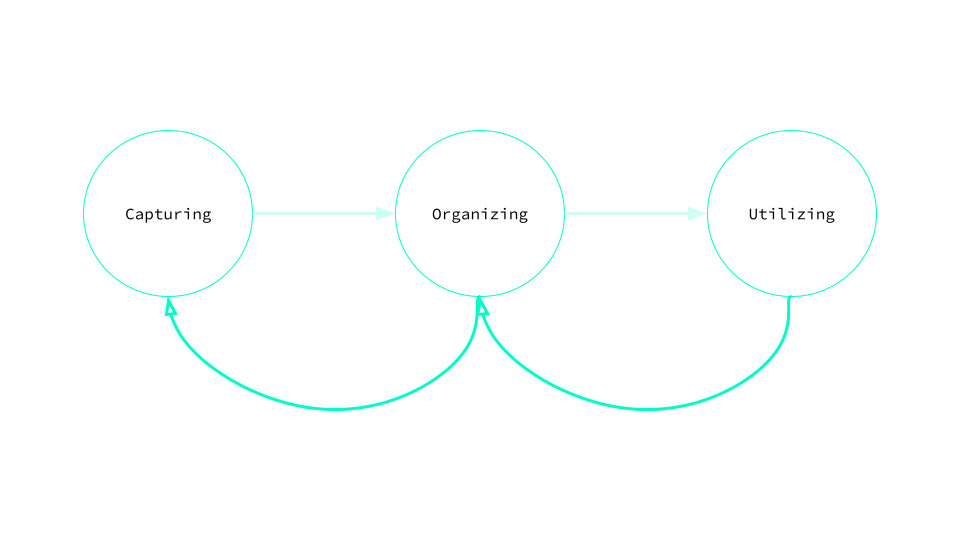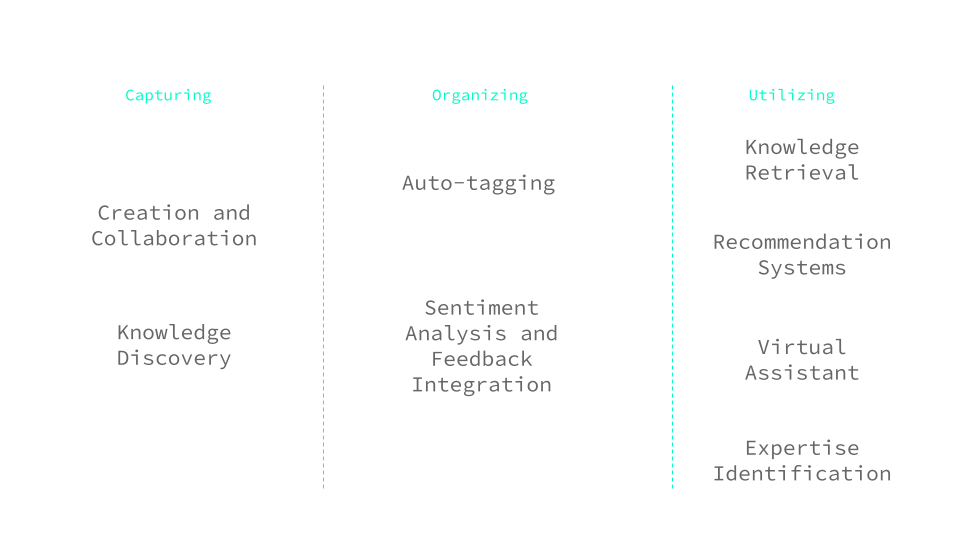How can AI help Organizations improve their Knowledge Management?

Artificial Intelligence (AI) in its broad meaning, that is the joint activity of automating and predicting things, can help, streamline or yet augment knowledge management processes.
Let’s first have a quick remainder of the different processes of knowledge management, before seeing how AI can augment it.
We defined three main processes in Knowledge Management:
- Capturing or Knowledge Integration
- Organizing or Knowledge Classification or Categorization
- Utilizing or Knowledge Retrieval

Knowledge, or information, naturally flows from left to right, from capturing to using. Indeed, before anything else, you must capture knowledge. We cannot use something we don’t have.
Knowledge management adds feedback loops: a systemic flow of knowledge and information. Something data science, machine learning and AI are very good at doing.
The way we use and organize things better defines how we should respectively organize and capture them. In practice: we use knowledge on things to organize them and organize things to better capture them.
AI in Knowledge Management

AI can help organizations improve their knowledge management in multiple ways:
-
Automated Knowledge Discovery: AI algorithms can analyze large amounts of structured and unstructured data to identify relevant knowledge resources and insights. This helps organizations discover new knowledge and fill gaps in their existing knowledge base.
-
Efficient Knowledge Retrieval: AI-powered search engines can enhance knowledge discovery by providing more accurate and contextually relevant search results. Natural language processing (NLP) techniques enable users to ask questions in a conversational manner and receive precise answers from the organization’s knowledge repository.
-
Intelligent Categorization and Tagging: AI algorithms can automatically categorize and tag documents, articles, and other knowledge assets based on their content, making it easier for users to navigate and retrieve information. This improves knowledge organization and ensures content is accurately indexed.
-
Personalized knowledge Recommendations: AI systems can analyze individual user preferences, search history, and behavior patterns to provide personalized knowledge recommendations. This helps users discover relevant content they may have otherwise overlooked and improves the efficiency of knowledge sharing.
-
Knowledge Creation and Collaboration: AI-powered tools facilitate collaborative knowledge creation by assisting teams in capturing, documenting, and organizing their knowledge. These tools can automatically extract insights from conversations, meetings, and documents, creating a shared knowledge base that can be accessed by team members in real-time.
-
Knowledge Virtual Assistants: AI-powered virtual assistants can provide employees with instant access to information and support, acting as a self-service knowledge resource. These assistants can answer frequently asked questions, provide step-by-step guidance, and facilitate the transfer of knowledge within the organization.
-
Expertise Identification: AI algorithms can identify subject matter experts within an organization based on their contributions, expertise, and past experiences. This helps connect employees with the right experts, fostering knowledge sharing and collaboration.
-
Sentiment Analysis and Feedback Integration: AI can analyze user feedback, sentiment, and interactions with knowledge resources to evaluate their effectiveness. This helps organizations understand which knowledge assets are most valuable and identify areas for improvement.
We will dig deeper into each of these techniques in future posts.
Overall, AI can enhance knowledge management by automating processes, improving search and discovery, facilitating collaboration, and creating a more intelligent and personalized knowledge environment.


